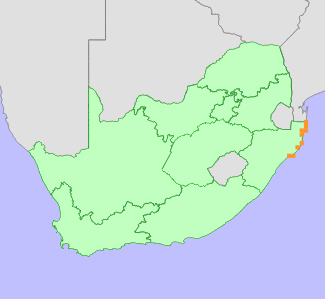|
Scientific Name | Thesium vahrmeijeri Brenan |
Higher Classification | Dicotyledons |
Family | SANTALACEAE |
National Status |
Status and Criteria | Endangered B1ab(ii,iii)+2ab(ii,iii) |
Assessment Date | 2023/02/13 |
Assessor(s) | N. Lombard |
Justification | An endemic species to the Indian Ocean Coastal Belt biome shared between Mozambique and South Africa, this species is known from 7-10 locations with an extent of occurrence (EOO) of 1128-3861 km² and an area of occupancy (AOO) of 64-72 km². Large areas of suitable habitat in the south and west of its distribution range have been lost to human settlements, agricultural practices, mining and industry. The population is therefore inferred to be declining. Several large subpopulations remain unthreatened within protected areas, however there is ongoing loss of habitat outside of protected areas. It is therefore assessed as Endangered under criterion B. |
Distribution |
Endemism | Not endemic to South Africa |
Provincial distribution | KwaZulu-Natal |
Range | This species is found in coastal regions between the Mozambique border and Richards Bay in KwaZulu-Natal province, South Africa. |
Habitat and Ecology |
Major system | Terrestrial |
Major habitats | Indian Ocean Coastal Belt |
Description | It is restricted to sandy soils in coastal grasslands. |
Threats |
| Much suitable habitat has been destroyed due to mining and industry in the south of this species' distribution range and expanding informal human settlements and wood plantations in the west is causing ongoing habitat loss. The status of two historical sites in the vicinity of Richards Bay are unknown but little suitable habitat remains in this area. Known remaining subpopulations are within protected areas and are not threatened, however since suitable habitat does exist outside of protected areas, ongoing decline to the population as a result of habitat loss is suspected to be taking place. |
Population |
The population of this taxon is declining due to habitat loss as a result of human settlements, agricultural practices, mining and industry. Several large subpopulations persist within protected areas. It is possible that there are as yet unrecorded subpopulations occurring on the Maputaland Plain of southern Mozambique.
|
Population trend | Decreasing |
Assessment History |
Taxon assessed |
Status and Criteria |
Citation/Red List version | | Thesium vahrmeijeri Brenan | Data Deficient (Taxonomically Problematic) | Raimondo et al. (2009) | | Thesium vahrmeijeri Brenan | Data Deficient | Scott-Shaw (1999) | |
Bibliography |
Brenan, J.P.M. 1979. Three new species of Thesium (Santalaceae) from South Africa. Kew Bulletin 33(3):395-397.
Raimondo, D., von Staden, L., Foden, W., Victor, J.E., Helme, N.A., Turner, R.C., Kamundi, D.A. and Manyama, P.A. 2009. Red List of South African Plants. Strelitzia 25. South African National Biodiversity Institute, Pretoria.
Scott-Shaw, C.R. 1999. Rare and threatened plants of KwaZulu-Natal and neighbouring regions. KwaZulu-Natal Nature Conservation Service, Pietermaritzburg.
Visser, N., le Roux, M.M. and van Wyk, B.-E. 2018. A taxonomic revision of the Thesium goetzeanum species complex (Santalaceae) from Lesotho, South Africa and Swaziland. South African Journal of Botany 119 45-62.
|
Citation |
| Lombard, N. 2023. Thesium vahrmeijeri Brenan. National Assessment: Red List of South African Plants version 2024.1. Accessed on 2026/01/13 |
 Comment on this assessment
Comment on this assessment


